
by Emily Hanson at Lease Fetcher
“Why do you need a vegan car? You’re not going to eat the tyres are you?”
Cue the eye roll.
Of course you’re not going to eat the tyres. You’re not going to drink from the petrol tank. And you’re not going to have a chew on the steering wheel.
Whether or not you’re vegan yourself, if you’re reading this guide to help inform your next purchase, we assume you know that there is a far more to veganism than the food and drink you consume.
Now, before we get into our guide, we need to set the record straight to avoid disappointment. Like many things in life, it is not possible to buy a car that is 100% vegan. The Vegan Society defines veganism as “a way of living which seeks to exclude, as far as is possible and practical, all forms of exploitation of, and cruelty to, animals for food, clothing or any other purpose.”
So, whilst the process of manufacturing and running your car is not going to be completely free of animal exploitation, you can get very close.
If you decide you don’t want to globetrot on two feet forevermore, check out our vegan car buying guide!
Interior
The interior of a car can be a vegan nightmare. Leather seats. Leather steering wheel. Leather gear shift. Mohair floor mats. *shudders*
Interior-wise, there are some major aspects of a car you’ll need to investigate and swap out un-vegan for vegan materials:
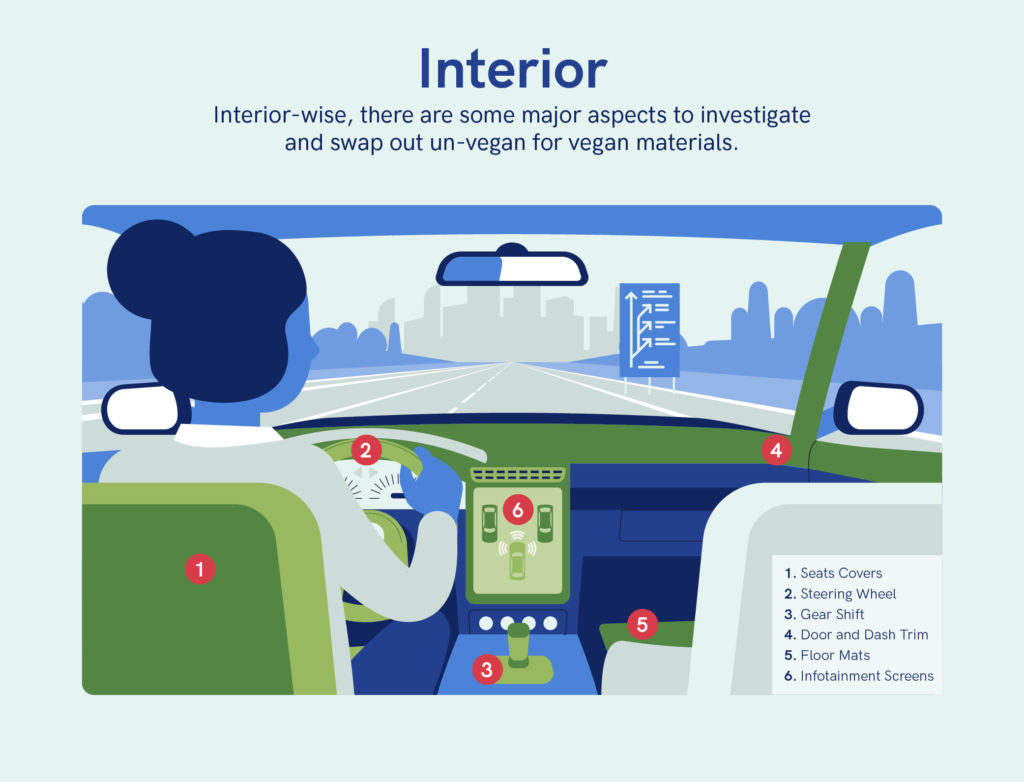
Seats, Steering Wheel, Gear Shift, and Trim
In most premium cars these days, what sets them apart (and pushes up the price) is that leather is used throughout the interior as standard.
This is something to keep in mind when you’re looking to buy a used car – you’re going to have a pretty tricky time finding a higher spec model that is leather-free. When you buy or lease a new car, you’ll have more flexibility to “veganise” the interior.
We have good news for your wallet though! Entry-level models are often the most vegan-friendly in a manufacturer’s line-up. Budget restrictions mean that more expensive materials like leather are not an option. Cloth seats and plastic trims and wheels are usually the standard.
But if you are looking for something a little swankier than scratchy plastics and basic cloth, we’ve gathered up leather alternative options from some major manufacturers:
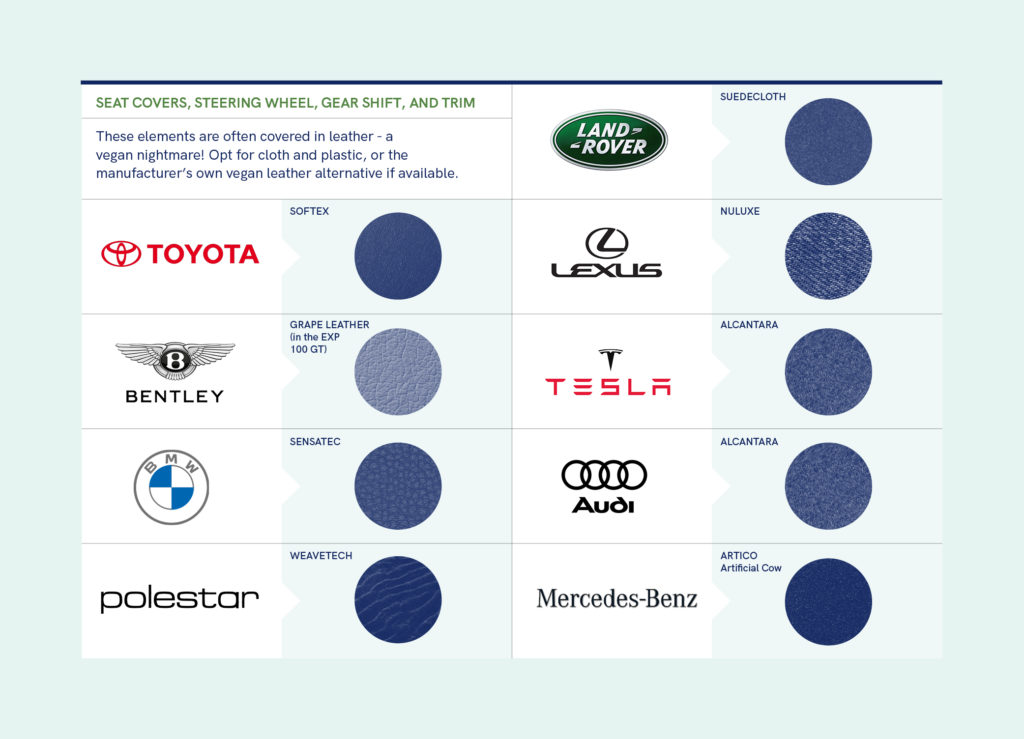
Floor Mats
Don’t stop there! The floor mats are not always vegan. Again, this is more of an issue for premium trims.
Floor mats are so easily overlooked, but if you forget to check out the composition of those in your dream car, you may be in for a nasty shock.
For example, Range Rover offers floor mats made of Mohair and leather binding. Imagine stepping on that when you’re taking your car for its first spin.
Fortunately, it’s very easy to find vegan floor mats and most often they are made of vegan-friendly synthetic materials.
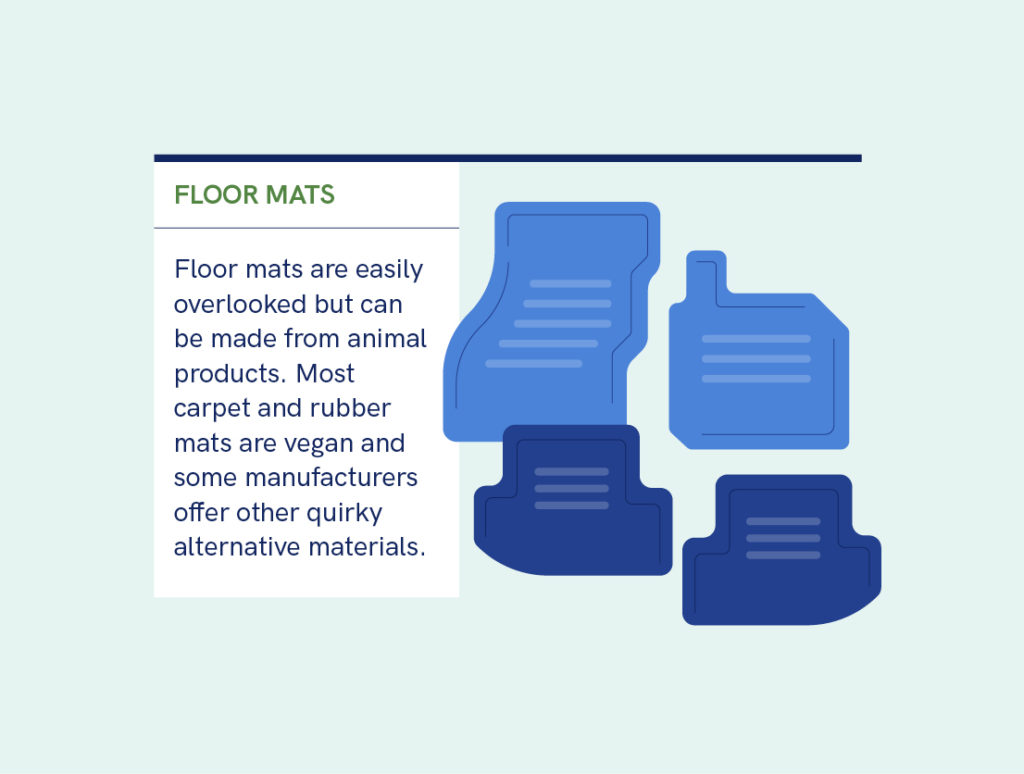
Infotainment Screens
This one is a bit of a curveball and unfortunately, it’s very tricky to get a clear cut answer from a simple Google search.
There is lots of information online which suggests that LCD screens are created using animal-derived materials. They allegedly contain liquid crystals which are based on cholesterol taken from animals. This means that the screen in your car’s infotainment system may not be vegan.
We don’t have a list of vegan-friendly car infotainment systems for you here, so if this is something you want to investigate more thoroughly, we advise you contact the car manufacturer directly for information.
One thing to remember, however, is that if you use a smartphone, a laptop or a TV, you are likely already using a non-vegan product. We’ll hark back to the definition of veganism here – “as far as is possible and practical.”
There are, unfortunately, basically no new cars without some form of LCD display. You would have to find a pretty old used car to find a model with no LCD screen.
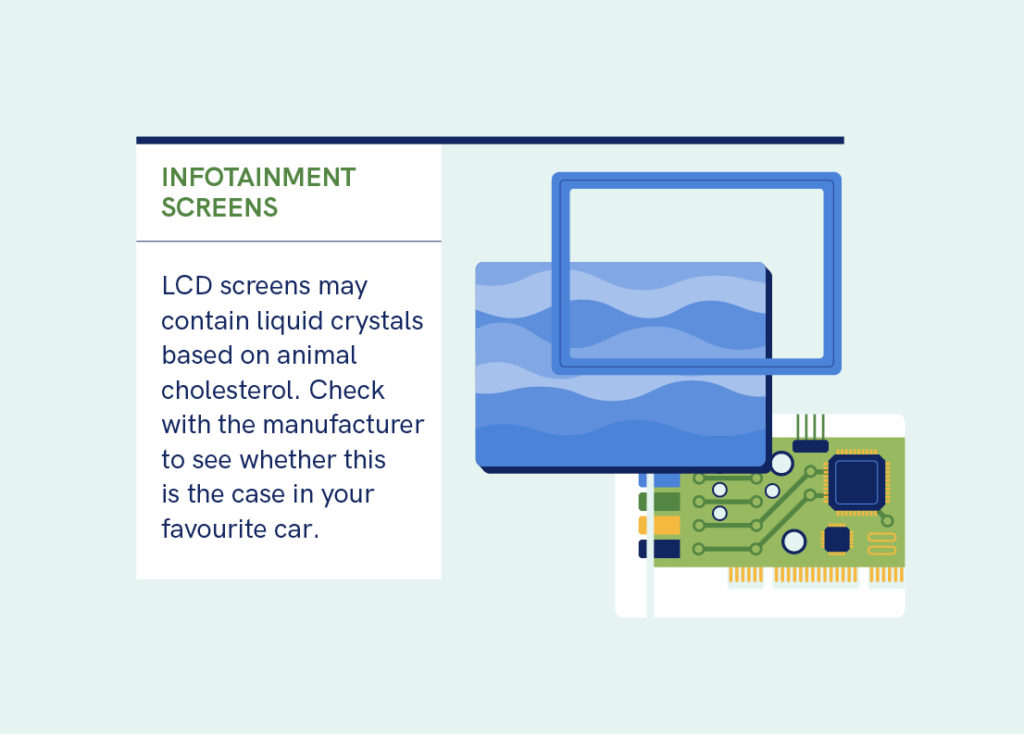
Interior Takeaways:
- Consider entry-level trims over premium.
- Swap out leather seats, steering wheels, gear shift and trims for vegan alternatives.
- Swap out non-vegan floor coverings for vegan alternatives.
- Contact manufacturer to verify whether LCD screen is vegan.
Structure and Exterior
Verifying whether a car is vegan-friendly goes much deeper than the materials used inside the car.
The use of animal products can be found in the bare bones structure of the car as well as in external features.
Here are another few aspects you’ll need to consider for your next new car:
Steel Frame
Animal fats are often used to lubricate steel.
The frame of the car itself is clearly not optional or something that can be swapped for a vegan-friendlier alternative with ease. So, like with the LCD screens, contact your chosen manufacturer directly for concrete information on the vegan status of the steel frames.
We can tell you that the Renault Twizy is PETA-approved: it has an almost entirely plastic build, with a steel chassis frame that uses no animal-sourced materials.
A spokesperson for the Vegan Society, Dominika Piasecka, has said “The key with veganism is trying to do your best… Avoiding leather is a practical thing we can do while buying a car, while we can’t of course avoid tyres or steel.”

Tyres
In the manufacturing of tyres, stearic acid is required. The chemical helps to give rubber its strength and to keep its shape without losing any grip on the road.
Stearic acid can be derived from both animal and plant sources, so you’ll need to ensure you use tyres that use natural, plant-sourced stearic acid.
Like lots of the elements in this guide, it feels like the information you need is under lock and key! Tyre manufacturers are not very forthcoming about the vegan status of their tyres, but fear not – you have loads of decent and accessible choices.
Luckily, one of the biggest tyre manufacturers, Michelin, is completely vegan. Kenda tyres are also all vegan, using stearic acid derived from refined tree oil.
Dunlop/Goodyear, Pirelli, and Continental all have vegan options too, but you’ll need to speak to a representative to confirm which options are available to you.
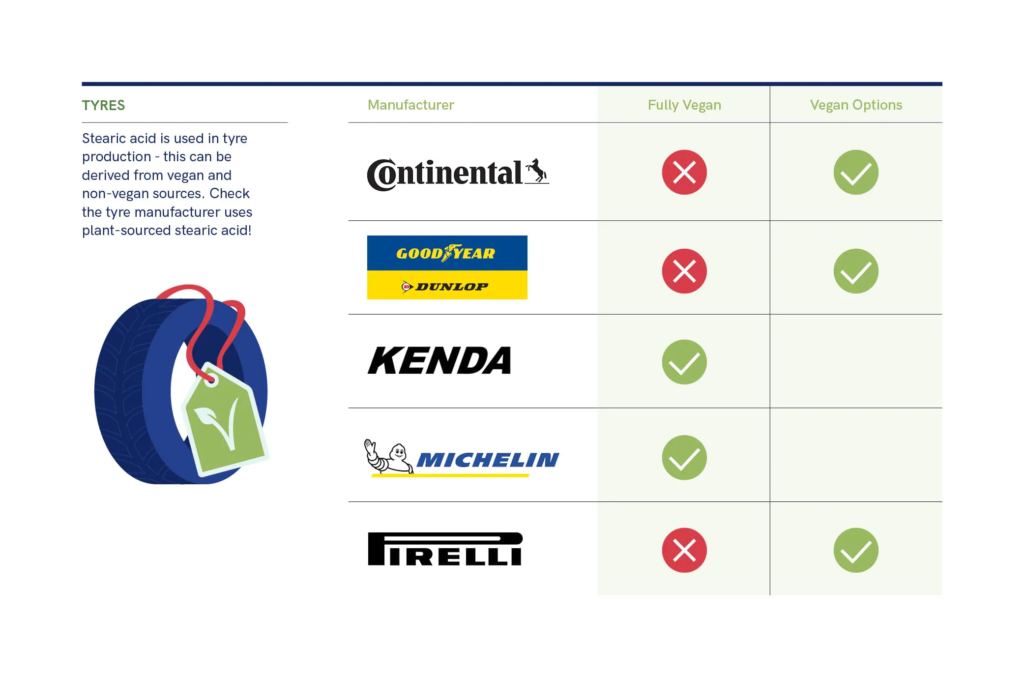
Structure/Exterior Takeaways
- Contact the manufacturer to see if the steel frame is lubricated with animal fats.
- Verify your tyres are produced using vegan stearic acid.
Wider Company Ethics
Of course, if you are vegan, you are not content to simply purchase a vegan product if the company behind it doesn’t reflect vegan ethics on a wider scale (Hello, L’Oreal marketing products as 100% vegan but testing on animals…).
Animal Testing
There was a lot of controversy in recent years when it came to light that Volkswagen (owners of many companies including Audi, Porsche, Skoda, Seat, and Bentley), BMW (owners of MINI and Rolls-Royce), and Daimler (owners of Mercedes-Benz and Smart) were using monkeys in their diesel emissions tests.
In the modern day, car manufacturers themselves do not use animals for emissions and safety testing. It’s up to you whether you want to hand your cash over to a manufacturer (and associated brands) with a grim track record.
Vegan Range vs Animal Product Range
You’ll have this same dilemma with other purchases you make. To buy from a 100% vegan faux meat brand or buy a vegan product from a meat brand? To buy a vegan-friendly car from a brand who offers vegan options as a token gesture, or a brand that is creating vegan options faster than non-vegan?
When you’ve settled on a few models you like, weigh up the other options they have in their range. Are they pumping out leather options faster than ever? Or are they going down a greener path?
For example, Land Rover offers Suedecloth (made from recycled plastic bottles) but the Range Rover is available with leather steering wheel, leather seats, leather headlining, Mohair floor mats with leather binding, leather pillow pack, and more.
Companies like Tesla, on the other hand, have made the Model 3 completely and utterly vegan. The same can be said for the BMW i3, which offers no standard leather options, plus it’s 95% recyclable.
Environmental Commitment
To address every possible dimension of the impact of your car purchase, you should consider the impact your car choice has on the environment. Fossil-fuelled cars’ impact on the environment is harmful to human and animal life.
Do you want to line the pockets of a company who has made minimal commitment to low and zero emission cars? Or to reduce the impact of their petrol and diesel models?
Most major manufacturers have at least one electric model in their line-up, but many have yet to release theirs, and won’t for a few years.
Dacia, Jeep, Land Rover, and Suzuki are amongst the well-known automotive players without a single electric vehicle on the market yet.
On the other hand, you’ve got Audi, BMW, Mercedes, Toyota, Honda, Hyundai, Jaguar, Kia, Nissan, Peugeot, Porsche, Renault, Seat, and Skoda all investing bags of cash to purify their fleets.
And we can’t forget the 100% electric Tesla and Volvo’s electric sub-brand, Polestar.
When picking a properly vegan-friendly car, consider a fully electric or at least a hybrid model.
Our Top Vegan-Friendly Car Picks
We’ve rounded up a few of our favourite vegan cars to help you narrow down your choices. There is a lot of information in this guide after all!
Whether you’re looking for a pretty basic entry-level car, a compact city car, a premium saloon, or a futuristic all-electric sports car, there’s something on this list for everyone:
For City Dwellers…
BMW i3
The BMW i3 doesn’t look like a stereotypical BMW. As BMW’s first ever all-electric car, it has a very bold and quirky design. Eco conscious vegans will love that it’s made mostly of carbon fibre rather than steel and the car is 95% recyclable. BMW claims that 27 recycled plastic bottles are used in the production of the seats and doors, and Kenaf is used in place of petroleum-based plastics on the door panels. It’s a very practical car with a range of up to 188 miles on a single charge.
SEAT Mii Electric
This electric city car is cheap and cheerful! If you don’t want to go fully electric just yet, you can also get an ICE version. If you’re looking for a functional car to get you from A to B without blowing your budget, the Mii Electric is a great choice. As a budget model, you’ll find cloth seats and you can opt for Alcantara on the steering wheel in place of leather.
Renault Twizy
We don’t really expect you to rush out and buy a Twizy, but it had to make the cut – it’s PETA approved after all! The Twizy is an eccentric electric vehicle made almost completely of plastic. Whilst its ethical credentials look good on paper, it’s not the most practical choice in the world: it is a glorified go-kart, really. If you’re a fan of Renault, look at the all-electric Renault ZOE instead with its 100% recycled dash and seat material.
For Families…
Nissan Leaf
The Leaf is the most popular electric car in Europe! With a 170 mile electric range, it’s a fantastic, affordable choice if you want to do your bit for the planet. It’s available without leather seats and leather steering wheel (make sure you specify), and the “gearshift” is simply a plastic switch.
Ford Fiesta
Here’s our first non-electric car on the list if it’s not your bag yet! The Fiesta has been the UK’s best-selling car for years. It is great value for money, practical, and packs decent performance. The entry level “Style” trim is the only one without any leather in the interior as standard, but if you do want a pricier trim, you can swap it out.
Toyota Prius
You know you’re getting quality with a Toyota – the best-selling car manufacturer in the world struck gold when they released the Prius. This hybrid model offers an easy transition into the electric world and is favoured by families and business executives alike. The basic specs come with cloth seats (with only the top tier trim coming with standard leather seats), but you’ll need to specify that you don’t want a leather steering wheel.
For Premium Appeal…
Tesla Model 3
As of August 2019, the Model 3 is 100% free of leather. Instead, Tesla uses an ultra-white synthetic material (Alcantara) on the door trims, headling, seats, and steering wheel. It’s fully electric (if you hadn’t heard already…) with an enormous 348 mile range, and it’s filled to the brim with cool, innovative tech.
Polestar 2
Polestar (Volvo’s electric sub-brand) was given a Compassionate Business Award by PETA for its leather-free interiors, so of course it had to make the cut. The electric fastback rivals the likes of Tesla, but is a lesser-known brand that is worth supporting.
Mercedes A Class
The A Class is a premium model at an affordable price point, and most importantly, can be made vegan-friendly. As the entry-level Mercedes offering, the seats are fabric as standard, or you can opt for Artico. The steering wheel is leather, so you’ll have to specify you want a vegan alternative. If you want to boost its eco creds even more, you can go for the plug-in hybrid variation.
For Gearheads…
Porsche Taycan 4S
We couldn’t complete this list without a sports car, so here you are: the Porsche Taycan 4S. If you’ve got the cash to splash and you want something with a little oumph, then the Taycan is worth considering. The Taycan can be kitted out in vegan leather which emits 80% less CO2 than normal leather to produce, plus the flooring is made of Econyl (recycled fishing nets). And, wait for it – it’s 100% electric! So, you’ll not have to weigh up the pros and cons of your need for speed with the harmful CO2 emissions of traditional sports cars.
Final Thoughts
Veganism is a big commitment that affects all sorts of areas of consumerism, and cars are no exception!
We hope this guide has helped you think outside the box, beyond leather seats! Whether you’re a vegan for ethical or environmental reasons, or both, then there’s a lot of food for thought when picking your next car.
The materials used inside and outside of the car, the ethics of the brand, and the brand’s eco-credentials should all factor into your decision – it’s up to you to decide what balance is right for you.
Happy browsing!
ABOUT LEASEFETCHER
LeaseFetcher is a leading car leasing comparison website. It automatically collects millions of prices from leading leasing brokers and allows users to search, filter and compare prices to find the offer that’s best for them.

